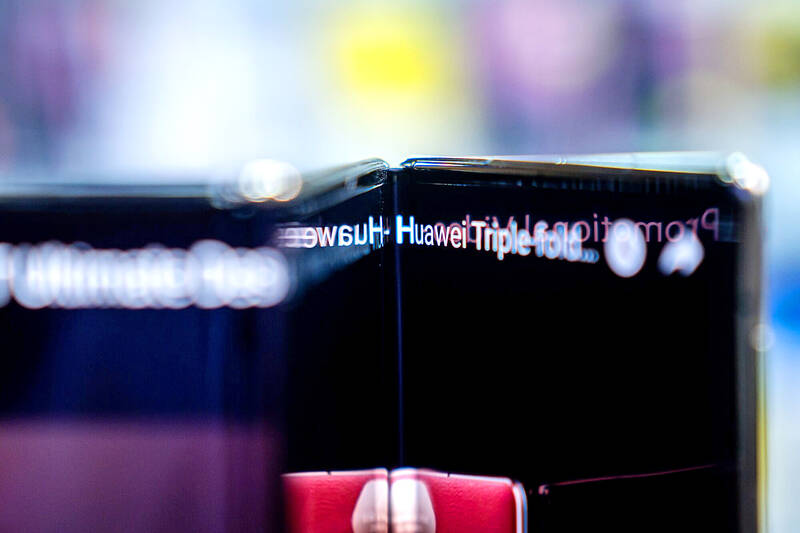US lawmakers are pressing the administration of US President Joe Biden to block Huawei Technologies Co (華為) suppliers from buying American chipmaking gear, escalating efforts to prevent the sanctioned Chinese telecom giant from making progress on semiconductor manufacturing.
The top lawmakers on the US House of Representatives China Select Committee outlined their concerns in a letter on Wednesday to US Secretary of Commerce Gina Raimondo, whose agency oversees export controls on advanced chips and manufacturing tools.
They pointed to Chinese firms Shenzhen Pengxinxu Technology Co (鵬新旭), Shenzhen SwaySure Technology Co (昇維旭), Qingdao Sien Technology Co (青島思恩) Pengxinxu and “potentially many others” as likely members of Huawei’s “clandestine network,” citing Bloomberg reporting.

Photo: Bloomberg
The US and its allies have broadly blocked sales of the most advanced chips and manufacturing gear to China, including from three US firms — Applied Materials Inc, Lam Research Corp and KLA Corp — as well as Dutch lithography system maker ASML Holding NV and Japanese toolmaker Tokyo Electron Ltd.
Washington has also imposed additional sanctions on a host of Chinese companies, including Huawei and Shanghai-based partner Semiconductor Manufacturing International Corp (中芯), that bar purchases of American technology without a US government license.
Chinese companies not on the so-called entity list can still access fairly mature chip equipment without Washington’s approval.
“We must continue in our efforts to deny Huawei, and similar firms, the ability to access US technology,” wrote committee chairman John Moolenaar and ranking member Raja Krishnamoorthi.
Failing in that effort would only benefit a small number of US chip tool companies “at the expense of chipmakers worldwide who cannot sell their chips, undermining the intent of the Huawei listing, and harm our national security,” they said.
Chinese Ministry of Foreign Affairs spokeswoman Mao Ning (毛寧) told a news conference in Beijing on Thursday that her country opposed “the US overstretching the concept of national security, setting barriers and undermining normal cooperation between the two countries.”
The goal of the US-led campaign is to prevent China from developing a cutting-edge semiconductor industry that could benefit its military.

CHAOS: Iranians took to the streets playing celebratory music after reports of Khamenei’s death on Saturday, while mourners also gathered in Tehran yesterday Iranian Supreme Leader Ayatollah Ali Khamenei was killed in a major attack on Iran launched by Israel and the US, throwing the future of the Islamic republic into doubt and raising the risk of regional instability. Iranian state television and the state-run IRNA news agency announced the 86-year-old’s death early yesterday. US President Donald Trump said it gave Iranians their “greatest chance” to “take back” their country. The announcements came after a joint US and Israeli aerial bombardment that targeted Iranian military and governmental sites. Trump said the “heavy and pinpoint bombing” would continue through the week or as long

TRUST: The KMT said it respected the US’ timing and considerations, and hoped it would continue to honor its commitments to helping Taiwan bolster its defenses and deterrence US President Donald Trump is delaying a multibillion-dollar arms sale to Taiwan to ensure his visit to Beijing is successful, a New York Times report said. The weapons sales package has stalled in the US Department of State, the report said, citing US officials it did not identify. The White House has told agencies not to push forward ahead of Trump’s meeting with Chinese President Xi Jinping (習近平), it said. The two last month held a phone call to discuss trade and geopolitical flashpoints ahead of the summit. Xi raised the Taiwan issue and urged the US to handle arms sales to

A magnitude 5.6 earthquake struck off the coast of Yilan County at 12:37pm today, with clear shaking felt across much of northern Taiwan. There were no immediate reports of damage. The epicenter of the quake was 16.9km east-southeast of Yilan County Hall offshore at a depth of 66.8km, Central Weather Administration (CWA) data showed. The maximum intensity registered at a 4 in Yilan County’s Nanao Township (南澳) on Taiwan’s seven-tier scale. Other parts of Yilan, as well as certain areas of Hualien County, Taipei, New Taipei City, Taoyuan, Hsinchu County, Taichung and Miaoli County, recorded intensities of 3. Residents of Yilan County and Taipei received

Taiwan has secured another breakthrough in fruit exports, with jujubes, dragon fruit and lychees approved for shipment to the EU, the Ministry of Agriculture said yesterday. The Animal and Plant Health Inspection Agency on Thursday received formal notification of the approval from the EU, the ministry said, adding that the decision was expected to expand Taiwanese fruit producers’ access to high-end European markets. Taiwan exported 126 tonnes of lychees last year, valued at US$1.48 million, with Japan accounting for 102 tonnes. Other export destinations included New Zealand, Hong Kong, the US and Australia, ministry data showed. Jujube exports totaled 103 tonnes, valued at